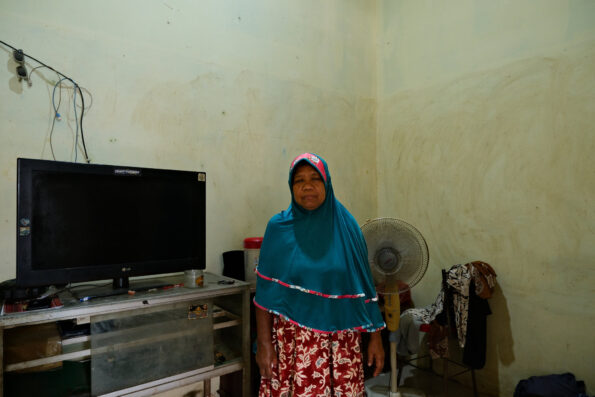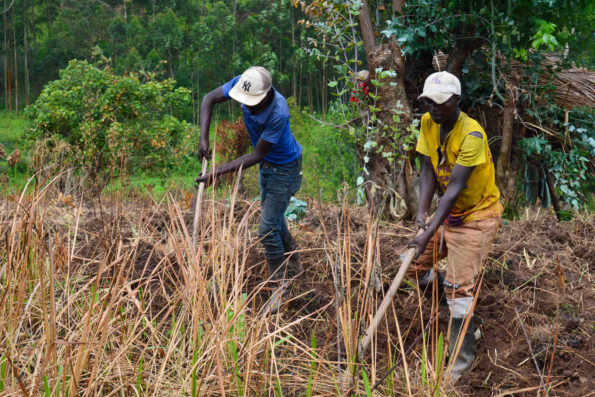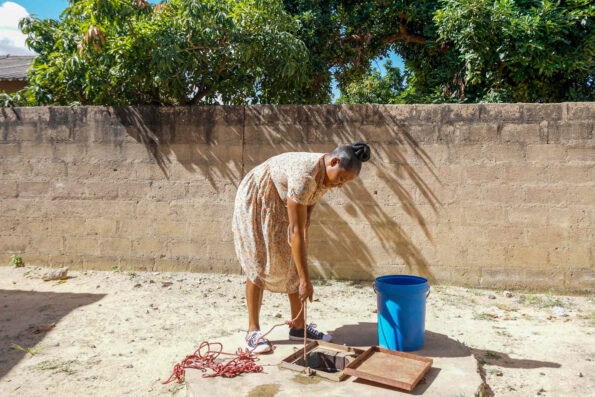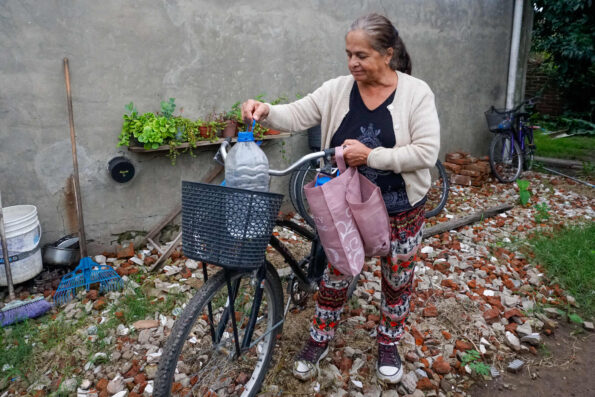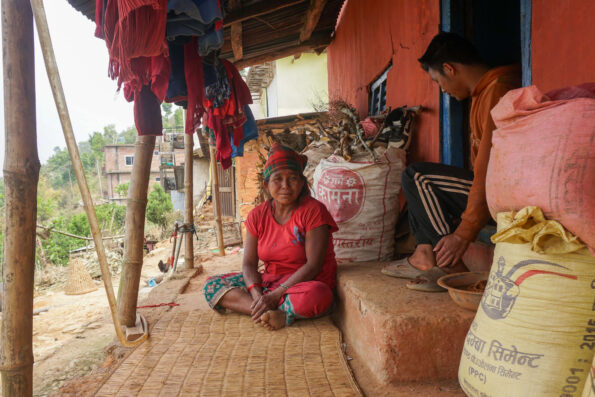
Irene Zih Fon, GPJ Cameroon
Romaric Nditat, from left, Ernest Benelesse and Eugène Manga of Kemit Ecology collect blocks of charcoal, which will harden under the sun.
DOUALA, CAMEROON ─ In a small compound here in Cameroon’s major port city, Müller Tenkeu Nandou prepares for the day’s work. He sorts corn husks waiting to be burned into charcoal, as two of his colleagues mount a tricycle to collect more vegetable waste from the Douala Central Market.
Nandou is the CEO of Kemit Ecology, a company that makes charcoal from household waste, including maize leaves and banana and plantain peelings.
A shipping container at one corner of the compound is the production site. At one side of the container is a pile of maize leaves, and at another a pile of plantain peelings ready to be dried under sunlight.
What started out as a class project in 2013 at the University of Douala has turned into an enterprise that buys household waste and converts it into clean energy for cooking. Nandou and his classmates studied ecology and the environment at the university and discovered that local people use mangrove trees, which grow in coastal regions, to smoke fish and do other cooking. At the same time, the city struggled to manage its waste.
“We thought that if we provided an alternative source of energy for the local people to dry their fish, they would no longer cut the trees,” says Nandou, 27.
After graduating from university, Nandou, with six of his classmates, scaled up the project and started a business. Now, Kemit Ecology has created a market for some of the city’s waste.



About 70 percent of households in Cameroon used wood as their main source of cooking energy in 2011, government data says. In Douala, an estimated 200,000 mangrove trees are cut down each year, according to a study published by the African Journal of Environmental Science and Technology in 2008.
Kemit Ecology’s innovation is not only supplying an energy source, it’s also commodifying a resource that was, before Nandou started his business, considered trash. Some local residents sort out their waste and bring banana and plantain peelings and maize leaves to sell to Kemit Ecology.
“Something that they were throwing away, now they are selling. A kilogram of waste costs 20 CFA (3 cents), and you see people coming here with 400 kilograms of waste (882 pounds),” Nandou says, referring to the Central African franc. “We are creating a big market of waste in Cameroon.”
The resulting coal is a good alternative to wood charcoal, which emits carbon dioxide, hence putting the health of users at risk, says Lucien Yoppa, an environmental officer at Fondation Camerounaise de la Terre Vivante, an organization that supports Kemit and other environmental projects.
“This coal will reduce the use of mangroves,” Yoppa says. “And people will no longer be concerned about how to manage their waste.”
Kemit Ecology could also help save lives.
More than 4 million people die prematurely from illnesses related to household air pollution as a result of using solid fuels for cooking, the World Health Organization says.
Most of Kemit’s customers are people who buy briquettes for their own household use, or stores that buy them in bulk for resale.



Dorice Djialeu says she likes Kemit Ecology’s briquettes because they’re inexpensive. She spends 500 francs (85 cents) for a kilo (2.2 pounds) of Kemit coal, which she says she can use for two days. A kilo of wood fuel costs 600 francs (about $1), she says, and it provides enough energy to cook just one meal.
One of Kemit Ecology’s biggest challenges is meeting what has become a high demand. The company produces one to two tons of charcoal each month, but that’s not nearly enough, Tenkeu says.
“We need to produce 20 tons of coal per month to supply the local market, and enable people to stop cutting mangroves for charcoal,” says Nandou.
More investment would help the company grow, Nandou says, adding that Kemit is eyeing Nigeria and Mali for future expansion.
Irene Zih Fon, GPJ, translated some interviews from French.
Editor’s note: This story was updated to correct a misspelled name in one caption.


